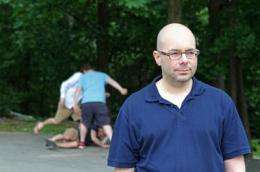Study suggests police officer wrongfully convicted for missing the 'obvious'

In a new study, researchers tested the claims of a Boston police officer who said he ran past a brutal police beating without seeing it. After re-creating some of the conditions of the original incident and testing the perceptions of college students who ran past a staged fight, the researchers found the officer's story plausible.
The study appears in the peer-reviewed open access journal i-Perception.
Psychology professors Christopher Chabris (Union College) and Daniel Simons (University of Illinois) often explore the limits of visual attention – in particular how people regularly fail to spot the obvious. Their most famous experiment involved a video of a "gorilla" walking through a group of people passing basketballs. The unexpected gorilla stopped in the middle of the scene, faced the camera, thumped its chest and then walked off screen. When study subjects were asked to count the number of passes by players wearing white and ignore those of players in black, half of them did not notice the gorilla.
That experiment is an example of what researchers call "inattentional blindness," the failure to see something unexpected if one is focused on something else. Not only can people miss obvious unexpected events, but almost everyone assumes, incorrectly, that they would notice the gorilla, the researchers said.
Chabris and Simons open their recent book, "The Invisible Gorilla," with a discussion of a 1995 case in which police officers brutally beat an undercover officer they thought was a murder suspect. Another officer at the scene, Kenny Conley, did not participate in the beating but ran past it in pursuit of the actual suspect.
Conley, who had climbed a chain-link fence to chase and capture the suspect, admitted that he ran past the spot where the police assault had taken place. But he denied seeing the beating. For this, he was convicted of perjury and obstruction of justice and sentenced to 34 months in prison. (The conviction was later overturned for technical reasons.) The verdict hinged on the belief that Conley must have seen the beating because, by his own testimony, he ran right past it.
To test whether someone could actually run past a fight without seeing it, Chabris and his students set up an experiment in which subjects had to "chase" a researcher for three minutes on a college campus. The subjects, who were tested individually, had to follow the runner at a distance of about 30 feet and count the number of times he touched his head.
On the way, the subjects passed a staged fight about 8 meters (26 feet) off the pathway they were using.

"We tried to set up conditions that were as similar as we could to the situation Conley faced while still maintaining experimental control," Chabris said. "Two students were beating up a third, and they were kicking and punching and yelling and coughing."
A first study was conducted at night to simulate the original incident. The researchers then repeated the experiment during daylight.
"At night, which was when officer Conley had his experience, only about a third of people noticed the fight," Simons said. "When we did it during the day, over 40 percent still missed it."
"One of the hallmarks of inattentional blindness is that increasing the demands on a person's attention decreases the likelihood that he or she will notice something unexpected," Chabris said.
To verify that inattentional blindness was involved, some study subjects were asked to keep separate counts for the number of times the runner's right hand and left hand touched his head.
"Keeping two counts made them much less likely to notice the fight than keeping no counts," he said.
"Physical exertion can also change your cognitive processing," Chabris said. "Doing something while your heart rate is 140 beats per minute is different than doing it with a heart rate of 60. Officer Conley was chasing a murder suspect at night, scaling a fence, and presumably watching the suspect to see if he had a gun or was discarding anything along the way."
"We can't say with certainty that Conley didn't see the fight," Simons said. "But the study shows that even under less demanding conditions than he must have experienced, it's possible to miss something as obvious as a fight."
Former Boston Globe reporter Dick Lehr, who followed the police brutality case over many years and wrote about it in a 2009 book, "The Fence," said the new study "further reinforces the conclusion I eventually reached regarding Kenny Conley not seeing anything," he said. "I think people generally have no idea how much we don't see and perceive."
Had the jurors on the Conley case seen this study, "they would have had the benefit of this kind of science," said Lehr, who now is a professor of journalism at Boston University. "They would have had ample doubt, reasonable doubt, about whether or not Kenny Conley saw the beating."
















